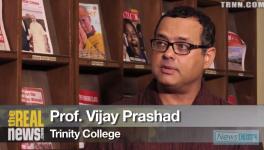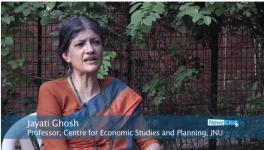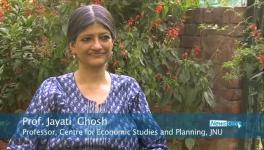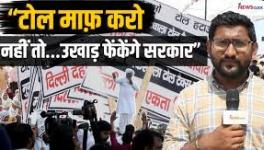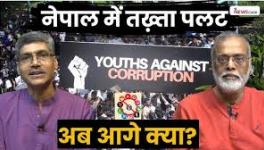"BRICS, IBSA should Reflect the Will of the People and not Interests of Capital in their Respective Countries" - Jayati Ghosh
Professor Jayati Ghosh, economist from the Jawaharlal Nehru University talks about the restructuring of the International Monetary Fund and the World Bank; in the context of the Brazil-Russia-India-China (BRIC) and the India-Brazil-South Africa (IBSA) summit held in April 2010.
Transcript
Prabir Purkayastha: The BRIC and IBSA Summits seem to have been indicating that G20 is the solution to the problems of the world, and they are happy that they have come out of the grip of G7 as it were. Do you really think that this is something that is going to happen?
Jayati Ghosh: Well, G20 is certainly better than G7 or 8, or G2, or G1, which is what it had become, really, but it's clearly not democratic still. I think the problem is that, when the global crisis broke, everyone really recognized that G8 had made a complete mess of it and certainly the US, which had been pushing its particular form of financial liberalization on the rest of the world, was completely wrong in doing so. But, when G20 came, it was first of all an attempt to circumvent the United Nations, which had already taken a very strong and very good stand on financial regulation, and secondly it was an attempt to co-opt the more powerful developing countries into somehow preserving the global system as it is.
Prabir Purkayastha: The BRIC as well as IBSA Summits seem to have indicated that they would like a complete overhaul of the IMF and the World Bank, two Bretton Woods institutions. Of course, the IMF and the World Bank have been very skewed in their economic voting strength. China has the same share of the vote as Canada has though the economy of Canada is much smaller. They've even given the deadline of November by which they would like this restructuring to take place. Do you think this would really have any impact on the IMF-World Bank? Do you think such a restructuring is possible?
Jayati Ghosh: Well, it's possible, certainly. I don't know if they are really asking for an overhaul. What they are really asking for is an increase in the voting rights of certain countries -- a very small handful of countries -- and it's not really in that sense a major transformation. They're asking for a few more voting rights to allow them to have slightly more say in some of the decisions of the IMF and the World Bank. But, let's face it, many of these things they could have actually done already -- even as G20, when they agreed to increase the funding of the IMF and the World Bank. They effectively brought the IMF back from dead: because it suddenly got an infusion of funds, it's relevant once again. They could have at that point stipulated that the IMF had to reform its policies. They didn't. So, increasing voting rights may make a few executive directors from some countries feel a little more powerful. I don't see it as very much more than that.
Prabir Purkayastha: And also asking that the heads of these organizations should not be the US and the European Union, which is what they have been, also by virtue of their voting strength.
Jayati Ghosh: Look, there's nothing wrong with that, of course we would all like to see a bit more diversity, but I think we have to recognize that there's a difference between symbolic and cosmetic changes and real changes. Changing the head of the organization? The UN has had heads from different countries, typically from very small developing countries as well. That hasn't in any way changed the fundamental proclivity of the UN, at the Security Council, to do the bidding of the great powers.
Prabir Purkayastha: The reserve currency of the world is the US dollar. There was some talk in the previous BRIC Summit that there should be really no such reserve currency of the world, there should be an expanded SDR, and so on. This summit seems to have gone back a little on that and talked about stabilizing the major currencies. Do you think this is something significant?
Jayati Ghosh: Well, unlike several others, I have never really seen the SDR as a viable alternative to the reserve currency for the simple reason that the SDR is just a weighted average of four major currencies. Now, countries that are worried about one currency or the other losing value will simply hold their reserves in ratios that they want to hold, of the four major currencies. Therefore, it doesn't make such a big difference. Let's face it: the dollar is not the reserve currency because there is some international law making it so; it's because countries want to hold dollars. Why do they hold dollars? Because they see the United States still as in a sense the leader of the global economy. It's not a very effective leader, it's not an efficient leader, it's an increasingly less powerful leader, but at the moment there is no alternative. It is still the main leader.
Prabir Purkayastha: Do you think China also has a vested interest in having the dollar as the reserve currency because they hold the largest foreign reserve in dollars?
Jayati Ghosh: It's a complicated situation with China. First of all, they don't want the dollar value to fall too much because they hold a lot of dollars, of course, but they also don't want the dollar value to fall too much because they are exporting to the US and they need to have their exports be competitive. All the talk about the international reserve currency and somehow making the SDR a viable alternative, it forgets about international political economy. It forgets that money is about power and that international money is about international power.
Prabir Purkayastha: Coming back to the issue of the IMF and the World Bank, the major criticism of the IMF and the World Bank has been about the policies: the fact that they have really opened up the Third World economies; so-called privatization, which is really distress sale of national assets; the financial opening of the markets; and so on. On this, BRIC as well as IBSA seem to be quite silent. Do you think they have any position on this? Or does the structural change that they are talking about effectively still underpin the same economic policies?
Jayati Ghosh: Yes. I think that's the worst part of BRIC, IBSA, G20, what have you. They have reinforced the IMF, which is essentially unreconstructed in terms of its policies. When the crisis broke, the IMF said: Mea culpa, we were wrong, we have to actually change, we are going to provide unconditional counter-cyclical lending. But what did they do? They didn't do that. All the eleven countries that have had to go to the IMF have had all the usual adjustment measures: cut public spending, cut pensions, cut public borrowing, etc., etc. -- all the usual kind of things that actually make the recession worse. So, the tragedy is that this was a period when the IMF really could have been told that you have to give non-conditional counter-cyclical lending. They were not. What has happened is basically a cosmetic change. In terms of the actual impact of the IMF in most of the developing countries that have had to go for their money, it's just the same.
Prabir Purkayastha: So, the BRIC/IBSA call really is for a change of personnel, a change of the guard as it were, but no fundamental change in the direction of the policies. . . .
Jayati Ghosh: Yes, and I think that reflects a deeper problem, which is that, now, unfortunately, too much of the mainstream press presents all these issues as a clash between countries. It's not. It's a clash between classes. The problem with the IMF, with the World Bank, with the WTO, with the policies of the United States is that they have reflected the interests of large multinational capital. What we have now with more people at the high table, more countries represented at the high table, is that larger segments of international large capital are being represented. We have to get to a point where BRIC and IBSA reflect the will of the people of these countries, not the capital of these countries.
Prabir Purkayastha: So, basically, democratization of the corporate capitalist world in that sense . . .
Jayati Ghosh: That's right.
Prabir Purkayastha: . . . that you get Reliances and Mittals also seats at the high table. . . . Jayati Ghosh: Exactly. Prabir Purkayastha:. . . represented with the government of India. . . .
Jayati Ghosh: And Thai corporate capital, and Singaporean corporate capital, and Brazilian capital, and so on and so forth.
Jayati Ghosh is Professor, Centre for Economic Studies and Planning, School of Social Sciences, Jawaharlal Nehru University, New Delhi, and Executive Secretary of International Development Economics Associates (IDEAs). The text above is an edited partial transcript of the interview curtsy Monthly Review .
Get the latest reports & analysis with people's perspective on Protests, movements & deep analytical videos, discussions of the current affairs in your Telegram app. Subscribe to NewsClick's Telegram channel & get Real-Time updates on stories, as they get published on our website.










